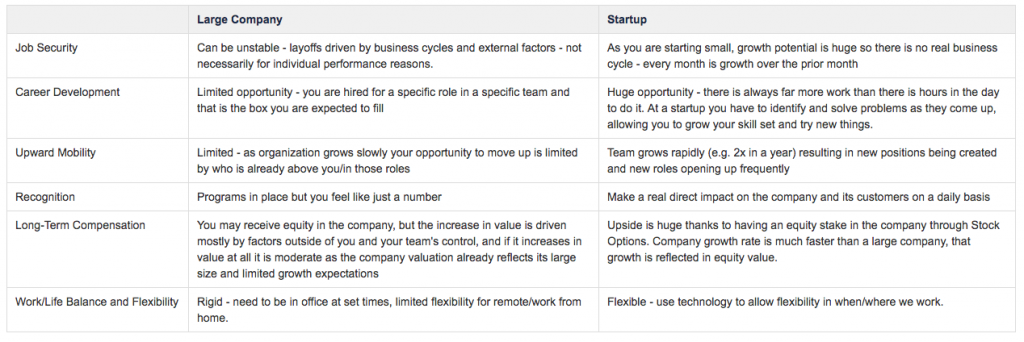BLOG
Why work for a startup instead of a large company?
7 min. read


Feb 21, 2019
This is a question I field quite frequently since we ramped up our Engineering hiring efforts in October 2018. Many of the roles we are hiring for are senior roles, and we often have candidates come to us who are either emerging from a larger company environment or are at a stage in their career where they perceive greater stability at a larger company.
While I’ve been at Plastiq since its early Series B days, I actually came to Plastiq after holding a set of leadership roles at much larger publicly-traded companies. So I feel I have a good vantage point from which to compare both options. I will first tackle some common¬†misconceptions I hear around the choice, which I have talked about with many potential candidates.
It’s more risky for my career to join a startup
This is the most common misconception I encounter. If you consider your career to be a long-term investment (which it is), joining a large company means you are going to likely (a) be using older technologies (as large companies do not adopt as quickly, are more risk-averse), (b) work in a more siloed environment where you do not get to see the full lifecycle of building products and (c) work with a larger team where other team members are already established in their roles/areas of expertise. These are all huge risks to your career – on the technology front you can easily end up 5 years behind the current technology trends – how will you catch-up if you work for a large company that purposely moves slower towards new technology? In the siloed environment, you don’t have a chance to round out your skill set and grow in your career. And with larger established teams you won’t get as much of a chance to learn new things because your role will be very specific and constrained. At startups, and especially at Plastiq, Engineers get the chance to move around between areas of the stack, work with different parts of the business etc. These movements ultimately make them better Engineers for Plastiq (as they have broader context and awareness of the business and how technology can solve business problems) and of course benefit them personally.
From a financial risk perspective – there is the perception that a startup company can fold at anytime, however that depends heavily on what stage the startup is at. Plastiq is now post-Series C – that stage is typically reserved for companies where we have validated product-market fit and revenue model, which is certainly¬†not at all the same level of risk as a seed stage startup. Indeed, large companies are arguably at greater risk that Series C+ startups of going out of business – large companies and their business models are being disrupted all the time by more agile startup companies.¬†A study from the John M. Olin School of Business at Washington University estimates that 40% of today’s Fortune 500 companies will no longer exist in 10 years. Shocking? Remember that 90% of Fortune 500 companies present in 1955 no longer exist today.
It will be easier to move forward in your career at a large company
Startup companies (like Plastiq) are small, but grow quickly – proportionally they may increase their workforce by 50% or more annually. This fast growth means that you get new opportunities to increase in seniority and responsibility. At large companies, they grow much more slowly – for that reason, there are less people moving around/in so you often get stuck – you would love to have more responsibility but you can’t because that would make you an Engineering Manager and you can’t because your boss is already the Engineering Manager. At Plastiq I can confidently say that as our team has grown, our existing team members have increased their responsibility, their relative seniority and their impact on the organization – and that is really what moving upward is all about.
Also, at a startup, you will have a lot more opportunity to expand into new areas and earn a variety of transferable skills. Once you are at a large company, career growth is relatively constrained along a set of predefined career paths. At a startup, the only limit is really your ambition. At Plastiq alone I can cite 3 specific instances from the last 2 years where employees got a chance to expand into a new career path Р(1) QA Automation Engineer became our Chief Architect, (2) Operations Manager became a Product Leader, (3) Accountant became our Data Analytics Lead. That kind of lateral growth is very hard to achieve at a large company.
My efforts will be recognized at a large company
At a startup (certainly true at Plastiq), the CEO knows every engineer by name and knows generally what you are working on. Can you really say that for a large organization? At a startup you get to make a real impact on the company, not just your own team. The effects of your work (good and bad) are obvious, and people know who’s doing what. You can work on code today, release to production today and have a positive impact on our customers today!
From a compensation perspective, the term “golden handcuffs” has become synonymous in popular culture with the incentives that large companies use to keep their key talent. I like to think of compensation strategy at a large company to be more like a “velvet coffin” – it is indeed very comfortable, but your career is decomposing in that environment. Also, the upside potential is far more limited – there are few large public companies you can point to that have doubled their valuation in 12-24 months – however for a startup that is not uncommon at all. At a startup like Plastiq you are offered an equity stake in the company that is very substantial compared to public companies which give you as an employee the opportunity to have your efforts at the company reflected directly in the valuation of the company.
A large company will offer a better benefits package
Many startups (certainly Plastiq) see people as their absolute #1 investment priority. Great people can make a huge difference in the success trajectory of a startup. To this end, we have assembled an amazing benefits package that we believe is best in class across all companies Рwhether large public companies or private startups. Some notable features to our benefits program (there is much more to it than this Рthese are just highlights):
- * Healthcare premiums for employees are paid 100% by Plastiq – that’s right, no monthly payroll deduction, we cover the cost completely for medical, dental, vision and life insurance coverage. Very few large companies offer this kind of coverage.
- * Lunch is catered 3 days a week – and if you don’t like our catered lunch options, the company will pay for your lunch outside the office
- * Free snacks and drinks at both our San Francisco and Boston offices
- * Unlimited use of Plastiq for free – employees get to use our service and pay no fees!
- * Pre-allocated budget for conferences and training opportunities.
We believe that people will make the difference in our success, that is why we invest so much in them!
A large company will offer more flexibility
We strongly believe in a strong work/life balance – I always like to say¬†that “it takes years of hard work to become an overnight success“. Building a company is a marathon not a sprint. We believe in pacing ourselves. We do work hard. Sometimes we need to go the extra mile. But we deliberately take time out when we need it. And we care most about getting the work done. Prefer to work from home to tackle a really hairy part of a solution? No problem. Need to take the afternoon off to run personal errands, and pick up your work at 8pm at night? Great. As long as the work gets done, we don’t mind.
At Plastiq Engineering we offer lots of flexibility so you can balance your life – whether that is working from home when you need to, paid parental leave (we offer¬†12 weeks of paid leave for new parents who are primary caregivers – moms and dads, and 10 weeks paid leave for secondary caregiver) – you do your best at work when you are happiest in your life. Sadly large companies don’t get this and to this day are very focused on their offices/campuses and expect you to be present and visible during core hours. They believe that¬†”Present” guarantees engagement and that being visibly¬†”Busy” guarantees productivity. At large companies, remote workers are often viewed as outliers, and leaders strive to keep teams local/together as they perceive that Software Engineering can’t possibly be done in a distributed manner (notwithstanding the 20+ years of evidence of high-quality open source software generated from widely distributed teams).¬†At Plastiq Engineering we are a distributed team across two major offices (San Francisco, Boston) with a group of Senior Engineers that work remotely across the country. Executing as a distributed team is natural for us.
Summary
Because I think of everything in relational terms (years of SQL will do that to you), I created a table to quickly summarize the elements I talked about above:

Finally – working at a startup is a LOT more FUN! We are a close knit-team, we work hard but also take time out to have fun together. The photo at the top of this post is from our recent team mini-golf outing at Stagecoach Greens in San Francisco¬†- eagle-eyed readers may see there’s actually an open spot in that picture for our next new hire! To learn more about our open opportunities open, see our KeyValues page.

Stay up to date!
Don't miss out on new features, announcements, and industry trends by subscribing to our newsletter.



